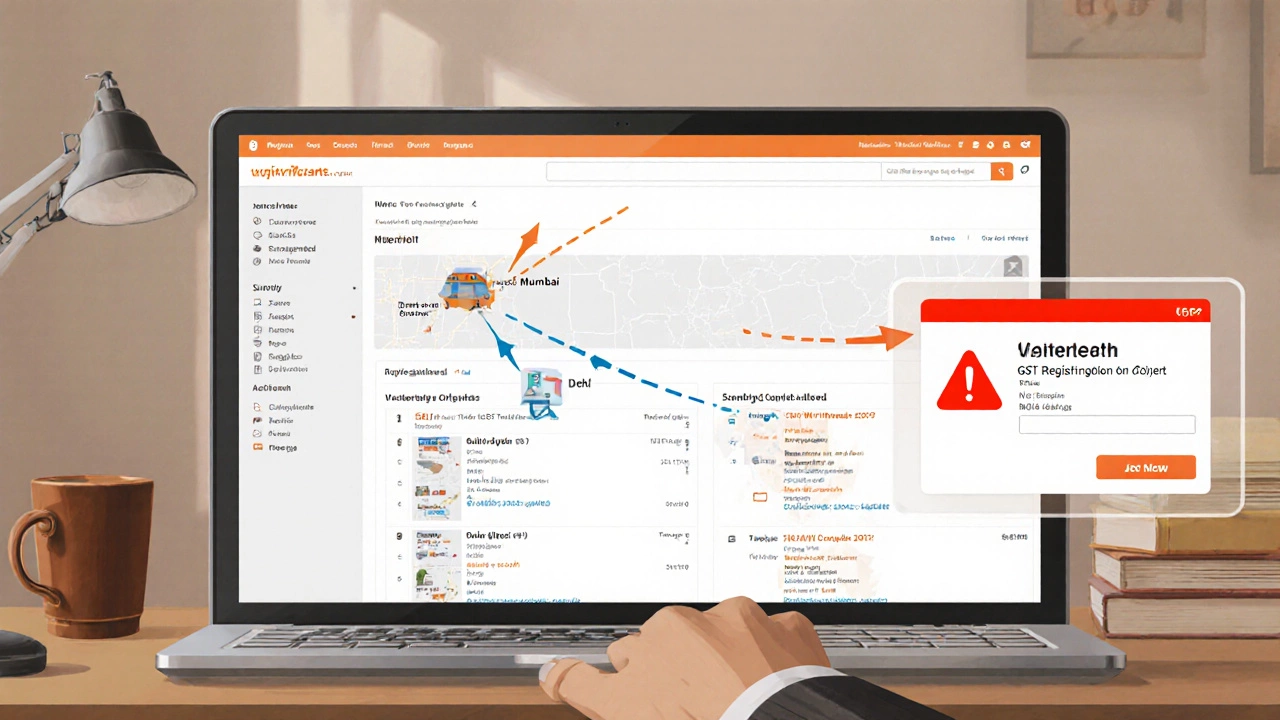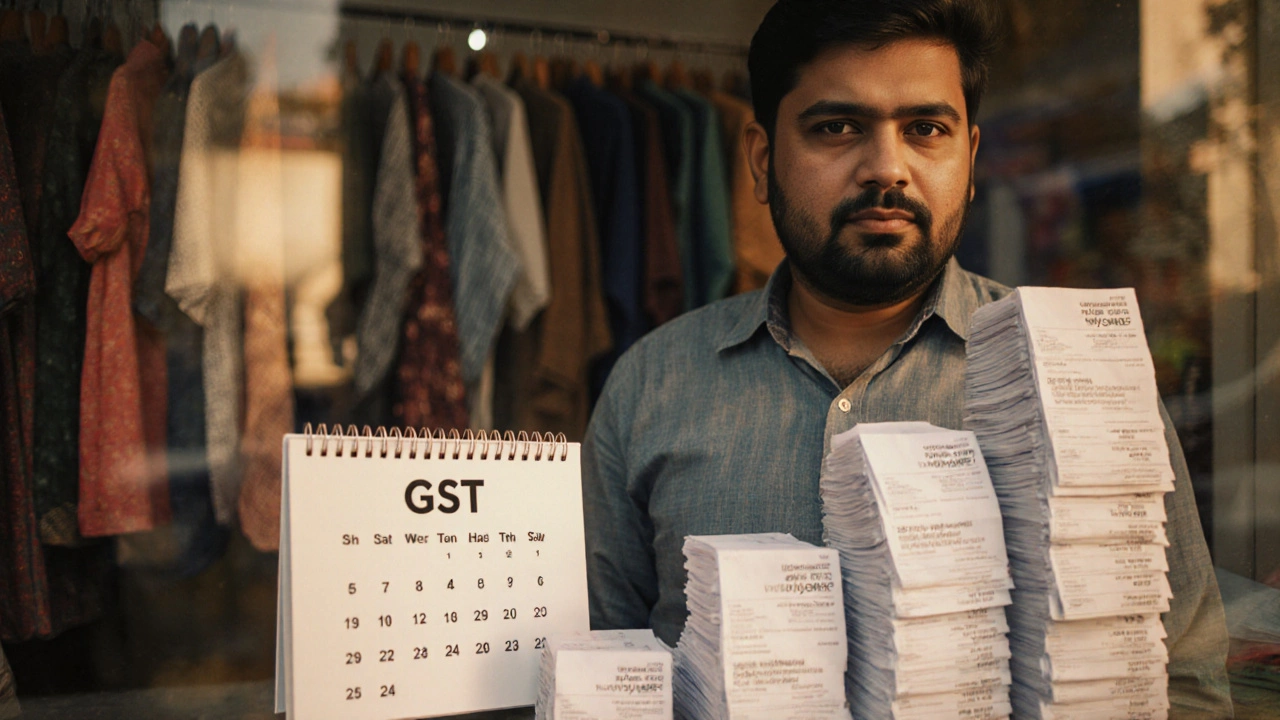GST Registration Eligibility Calculator
Is GST Registration Required for Your Business?
Find out if you need to register for GST in India based on your turnover and business type.
If you're running a business in India, you've probably heard about GST. But here’s the real question: Is GST registration mandatory in India? The answer isn’t a simple yes or no-it depends on your sales, your location, and what you’re selling. For many small business owners, this confusion leads to missed deadlines, penalties, or worse-shutting down operations because they didn’t know the rules.
When GST Registration Becomes Required
In India, GST registration is mandatory if your annual turnover crosses a certain limit. For most states, that limit is ₹40 lakh for goods and ₹20 lakh for services. But if you’re operating in the northeastern states or hilly regions like Uttarakhand, Himachal Pradesh, or Jammu & Kashmir, the threshold drops to ₹10 lakh for both goods and services.
Let’s say you run a small clothing store in Pune. If your sales hit ₹41 lakh in a financial year, you’re legally required to register for GST within 30 days. Miss that deadline? You could face a penalty of ₹100 per day, up to a maximum of ₹5,000. It’s not just about fines-without GST registration, you can’t issue tax invoices, claim input tax credit, or sell to other registered businesses. That means you lose access to bigger clients and government tenders.
Who Must Register Even Below the Threshold?
There are exceptions. Even if your turnover is below ₹20 lakh or ₹40 lakh, you still need to register for GST if you fall into one of these categories:
- You’re selling goods or services across state borders (inter-state supply)
- You’re an e-commerce seller, even if you’re just listing products on Amazon or Flipkart
- You’re an agent or input service distributor for a registered business
- You’re a non-resident taxable person doing business in India
- You’re supplying goods or services through an e-commerce platform
- You’re a casual taxable person (like a temporary vendor at a fair or exhibition)
For example, if you’re a freelance graphic designer based in Bangalore and you regularly take clients from Mumbai or Delhi, you’re doing inter-state supplies. Even if your total income is ₹15 lakh, you still need GST registration. Many freelancers miss this rule because they think they’re just ‘doing side work’-but the law doesn’t care how you label it.
What Happens If You Don’t Register?
Not registering when you should is risky. The GST department uses automated systems to track sales data from banks, payment gateways, and e-commerce platforms. If your bank account shows consistent inflows above the threshold, they’ll send you a notice. Ignore it, and you could get:
- Penalties up to 10% of the tax due (minimum ₹10,000)
- Interest at 18% per year on unpaid tax
- Seizure of goods during transit if you’re caught transporting without a GST invoice
- Blacklisting from government tenders or export benefits
One bakery owner in Jaipur didn’t register because he thought his monthly sales of ₹1.8 lakh were too low. He was selling online to customers in 12 states. Within six months, he got a notice for ₹2.3 lakh in unpaid tax, plus penalties and interest. He ended up paying over ₹3.5 lakh to clear the case.
Voluntary GST Registration: Should You Do It?
You don’t have to register if you’re below the threshold-but sometimes, it makes sense anyway. Voluntary registration gives you three big advantages:
- You can issue GST invoices, which makes your business look more professional
- You can claim input tax credit on purchases like packaging, office supplies, or software tools
- You can sell to big companies that only work with GST-registered suppliers
For example, a home-based candle maker in Chennai makes ₹18 lakh a year. She’s under the limit, so she doesn’t have to register. But when a boutique hotel chain wanted to buy 500 candles for guest rooms, they refused because she couldn’t provide a GST invoice. She registered voluntarily, got the contract, and ended up doubling her sales.

How to Register for GST
Registering is quick if you have the right documents. Here’s what you need:
- PAN card of the business owner or entity
- Proof of business address (rental agreement, utility bill, or property tax receipt)
- Bank account statement or canceled cheque
- Photograph and ID proof of promoters/directors
- Business registration document (if applicable-like MSME or shop act)
Go to the GST portal, click on ‘Services’ > ‘Registration’ > ‘New Registration’. Fill in your details, upload documents, and submit. You’ll get a temporary reference number. Within 7 working days, you’ll receive your GSTIN (GST Identification Number) via SMS and email.
There’s no fee to register. Beware of third-party agents who charge ₹2,000-₹5,000 to do what you can do yourself in 30 minutes.
Common Myths About GST Registration
There’s a lot of misinformation out there. Let’s clear up the biggest myths:
- Myth: Only big businesses need GST. Truth: Even a one-person consulting business needs it if they cross the threshold or do inter-state sales.
- Myth: GST is only for retailers. Truth: Service providers like lawyers, accountants, and tutors are included too.
- Myth: You can avoid GST by splitting your business into smaller units. Truth: The law looks at the total turnover under the same PAN. If you have multiple shops under one owner, they’re combined.
- Myth: If I sell only to consumers (B2C), I don’t need GST. Truth: If your turnover crosses the limit, you still need to register-even if you don’t charge GST to customers.
What If You’re Just Starting Out?
If you’re launching a new business, plan ahead. Don’t wait until you hit the limit. Register early if:
- You’re planning to sell online
- You’re working with distributors or wholesalers
- You expect rapid growth in your first year
Many startups delay registration because they’re unsure about sales. But if you’re serious about scaling, getting GST registered from day one saves headaches later. It also makes it easier to open a business bank account, apply for loans, or get listed on government procurement portals.

What About Exporters?
If you’re exporting goods or services from India, you must register for GST-even if your turnover is below ₹20 lakh. Exporters can claim refunds on taxes paid on inputs (zero-rated supplies). Without GST registration, you can’t access these refunds, which can eat into your profits.
For example, a small software firm in Hyderabad exports coding tutorials to the U.S. Their annual revenue is ₹12 lakh. They don’t need GST registration based on turnover-but because they’re exporting, they must register. Once registered, they file a refund claim and get back ₹1.2 lakh in taxes paid on software licenses and hosting services.
Final Checklist: Do You Need GST Registration?
Ask yourself these five questions:
- Is my annual turnover above ₹20 lakh (services) or ₹40 lakh (goods)?
- Do I sell to customers in other states?
- Do I list products on Amazon, Flipkart, or Meesho?
- Do I supply goods or services to government departments or large companies?
- Am I an exporter?
If you answered ‘yes’ to any of these, you need GST registration. If you’re unsure, calculate your sales from the last 12 months. If you’re close to the limit, register anyway. It’s cheaper to register early than to pay penalties later.
Frequently Asked Questions
Is GST registration mandatory for all businesses in India?
No, not all businesses. GST registration is mandatory only if your annual turnover exceeds ₹40 lakh for goods or ₹20 lakh for services (₹10 lakh in special category states). However, certain businesses like e-commerce sellers, exporters, or inter-state suppliers must register even below these limits.
Can I operate without GST registration if my sales are below the limit?
Yes, you can legally operate without GST registration if your turnover is below the threshold and you don’t fall into any mandatory categories like e-commerce or inter-state supply. But you won’t be able to claim input tax credit or issue tax invoices, which may limit your ability to work with bigger clients.
What happens if I don’t register for GST when I’m supposed to?
You’ll face penalties of ₹100 per day (up to ₹5,000), interest at 18% per year on unpaid tax, and possible seizure of goods. The GST department tracks bank transactions and e-commerce sales, so evasion is hard to hide. Many small businesses end up paying far more in penalties than they would have in GST.
Can I register for GST voluntarily even if my turnover is low?
Yes, you can register voluntarily. This helps you issue proper invoices, claim input tax credit on your purchases, and appear more credible to clients and partners. Many home-based businesses and freelancers do this to attract larger customers.
How long does GST registration take?
It usually takes 3 to 7 working days after you submit your application on the GST portal. You’ll get a temporary reference number immediately, and your GSTIN will be sent via SMS and email once approved. Make sure all documents are clear and correct to avoid delays.
Do I need GST registration if I sell only to individuals (B2C)?
Yes, if your total annual turnover exceeds ₹40 lakh (goods) or ₹20 lakh (services), you still need GST registration-even if you’re selling only to individual customers. The rule is based on turnover, not the type of customer.
Next Steps
If you’re unsure whether you need to register, start by calculating your sales from April 1, 2024, to March 31, 2025. Use your bank statements, UPI records, and e-commerce dashboards. If you’re near the limit, don’t wait. Register early. It’s free, fast, and protects you from penalties.
Keep a record of all your invoices, even if you’re not registered. If you grow fast, you’ll need them. And if you’re already registered, make sure you’re filing returns on time. Late filings bring their own penalties.
GST isn’t just a tax-it’s a business requirement. Get it right, and it opens doors. Ignore it, and it becomes a roadblock.

